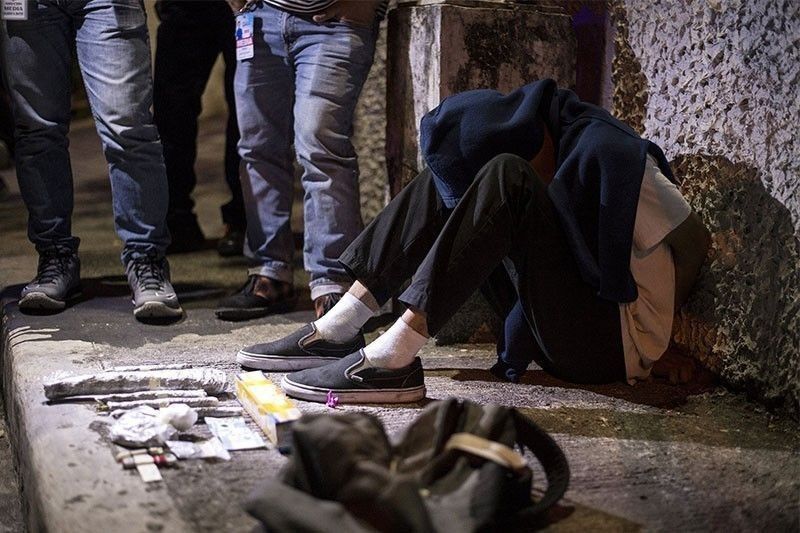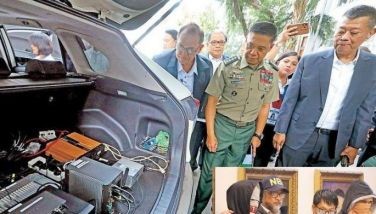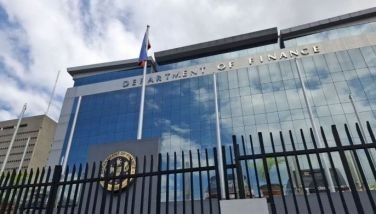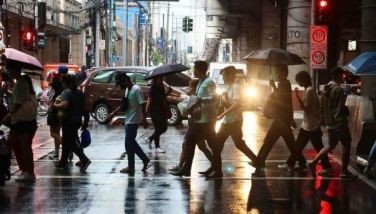ICC prosecution: High-profile DOJ-led review of 'war on drugs' killings a ‘desk review’

MANILA, Philippines — The high profile Department of Justice-led panel assessment of "war on drugs" operations that resulted in deaths was a mere "desk review" and does not reach the level of a domestic investigation that would merit a deferral of the International Criminal Court’s probe into the killings.
ICC Proseuctor Karim Khan has formally requested judges of the pre-trial chamber to move forward in the probe into the President Rodrigo Duterte’s “war on drugs.”
"I have concluded that the deferral requested by the Philippines is not warranted, and that the investigation should resume as quickly as possible," ICC prosecutor Karim Khan said in a statement issued in The Hague.
DOJ review panel
Khan noted that the Philippine government highlighted the DOJ Panel in its efforts to investigate the killings — an ambitious commitment that Justice Secretary Menardo Guevarra made before the United Nations Human Rights Council in June 2020, but was generally questioned domestically for its timing and motivation as ruse for the ICC investigation
But for the ICC prosecutor, the touted DOJ Panel merely did an administrative “desk review.”
Khan noted that the DOJ-led panel does not appear to have an authority independent from the justice secretary, citing the referral of cases to the National Bureau of Investigation for case build-up. NBI is attached to the DOJ.
Khan noted that the panel has so far referred 302 NBI cases -- 52 from the Philippine National Police Internal Affairs Service and 250 from the National Prosecution Service -- the Philippine government did not explain how the review was conducted.
The information table sent to the ICC prosecutor only contains observations and remarks on how the victims died and noted lapses in procedure, he said.
“However, there is no indication in these observations and remarks of any concrete investigative steps taken by the Panel in relation to any of the cases,” Khan said.
“Consequently, and in light of the observations and remarks provided, it appears that the Panel merely conducted a ‘desk review’ of these 302 cases, followed by a request or recommendation that an actual investigation be commenced by the NBI," he said.
Khan said the review "does not constitute investigative activity within the framework of article 18(2) [deferral request] and cannot justify deferral of the Court’s investigation."
The panel has drafted two reports since the start of the supposed "judicious review of the 5,655 anti-illegal drug operations where deaths occurred."
The first covered 300 cases in a handful of provinces such as Bulacan and Pampanga, but this was not publicized and was submitted directly to President Rodrigo Duterte.
A matrix was released on the second report that covered 52 cases from the police’s Internal Affairs Services where it found direct liability on cops involved in the deadly “war on drugs” operations.
NBI case buildup
Khan said that the NBI, which his office acknowledged is capable of conducting criminal probes, made concrete investigations in three of the four lists of cases.
The government did not respond to the ICC Prosecution Office which asked for more substantiation on remaining cases.
“A mere referral for investigation, without more, is insufficient to establish inadmissibility," Khan sakid.
But even if the NBI is taking concrete investigative steps on all cases referred them, the efforts “would still fall far short of seeking accountability for the thousands of killings attributable to police (and other groups) in the [“war on drugs”] context.”
“Such a limited fraction of cases would not adequately address the quantity, scope, and gravity of potential cases within the parameters of the Court’s investigation into the situation. On that basis also, the resumption of the Court’s investigation should be authorized,” he added.
The DOJ-led panel was seen to cover 5,655 cases, although advocacy groups have long claimed the number of those killed in the brutal anti-narcotics campaign is quadruple of the government’s numbers—and with only 302 referred to the NBI, the number seems like a drop in the bucket in the more than 20,000 deaths logged by human rights groups.
Beyond perpetrators
Khan noted that there was no indication of investigation of any pattern of criminality or systematicity, “including by those who would appear to be the most responsible for conceiving or implementing a policy.”
He also pointed out that the referred cases fail to consider responsibility of perpetrators who are of higher rank—those who had a hand in planning, coordinating and enforcing the operations.
The ICC prosecutor also stressed: “President Duterte and other high-level government officials also reportedly encouraged, supported, enabled, and excused the killing of drug users and drug dealers. These allegations underline the importance of an investigation that goes beyond direct perpetrators on the ground to explore the possible roles of more senior perpetrators.”
Former United Nations Special Rapporteur Agnes Callamard said the Philippine government’s review of “drug war” operations that resulted in deaths must go beyond police officers who killed, but must cover whoever may have emboldened them.
The benchmark for exacting accountability for killings and human rights violations in the country must also be beyond cops’ dismissal from service, but must reach the courts of law, Callamard added. “Being dismissed if you’ve killed people, that’s not acceptable,” she also said in January 2021.
Distancing
Outgoing Justice Secretary Menardo Guevarra, who will also be the incoming administration’s solicitor general, opted to defer commenting on the latest development at the ICC.
“As justice secretary I have much to say about this development, but it is both necessary and prudent that I first discuss this matter with the [Department of Foreign Affairs] and other agencies involved.
Outgoing President Rodrigo Duterte has been adamant that the ICC has no jurisdiction over the Philippines and his successor, President-elect Ferdinand Marcos Jr. echoed his sentiments.
Since he won the elections, Marcos has stressed the “importance of ensuring high-level of accountability in terms of human rights [violations].”
- Latest
- Trending

































